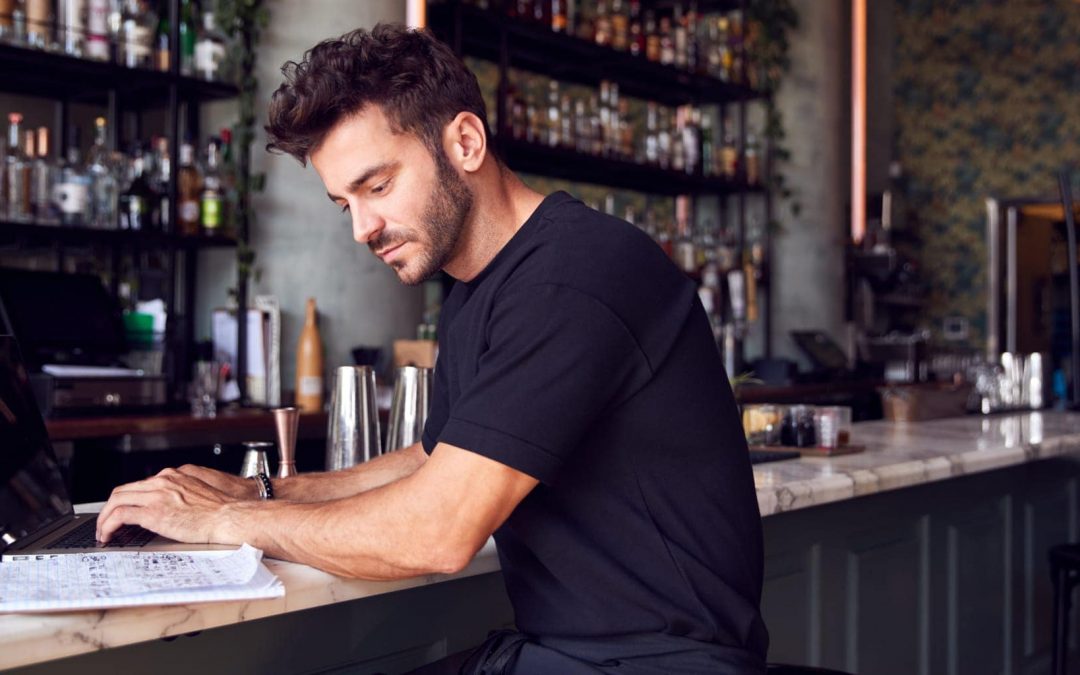Shake it Up: The Surprising Distinction Between Bartenders and Mixologists

To some, the words ‘bartender’ and ‘mixologist’ may seem interchangeable. In fact, they are not!
At its core, both bartending and mixology involve concocting a refreshing beverage for patrons. However, there is one essential distinction between these professions: while bartenders focus on providing customers with a quality drink within an allotted timeframe; mixologists take into consideration every aspect of their creation – from choosing ingredients to even designing labels.

To be a bartender requires more than possessing the skill necessary to mix up cocktails. It demands that you possess robust knowledge of alcoholic beverages as well as basic kitchen skills such as cutting fruit or slicing vegetables. Additionally, it necessitates an innate understanding of hospitality so patrons can feel welcomed when entering your establishment.
In contrast, those who pursue careers in mixology have access to a veritable cornucopia of recipes and ingredients that enable them to craft unique libations which perfectly embody their particular style. From this abundance comes an abundance of choice for any patron’s palate!

Bartenders are Savvier than you think
For example, what if I told you that bartenders could also be regarded as mixologists? This would certainly seem paradoxical; however, it is true! Many of the careers in this dynamic field do indeed possess both qualifications and occasionally even more than one.
That being said, in contrast to bartenders who typically have a focus on mixing drinks with little regard toward ingredients or techniques involved in creating them, mixologists are those who are skilled at utilizing their knowledge and expertise to cultivate creations that feature superior quality products.
What do bartenders do?
Ultimately, a bartender is a person who serves customers their beverage of choice regardless of its composition. In fact, it’s possible that the drink you’re ordering or consuming may not even contain alcohol; just as long as it has any alcohol content within it then everything should be fine – no worries!
For instance, if you order a hot toddy at your local B&B (see below), they will likely whip up one while utilizing some ingredients with alcohol content such as Ginger and honey – making sure any amount utilized is actually necessary for its formulation.
Mixologists are Savvier still

I have worked alongside mixologists for some time now, and I can attest that they are an incredibly knowledgeable group of individuals. Mixologists’ vocations require them to master a broad array of culinary techniques, from baking and fermenting; to roasting meats and preparing savory snacks.
In contrast to bartenders’ steadfast dedication to the service industry, these experts can be found behind both bars and in restaurants creating savory infusions and delectable punches from scratch. Utilizing their knowledge of flavor profiles, this cohort can create custom cocktails that take into consideration any given situation – whether it be for a party or informal gathering with friends!
Mixologists have undoubtedly emerged as the dominant force in today’s cocktail world – showcasing their expertise with advanced knowledge of spirits and mixology.
How did we arrive at this point?
In recent years, we have witnessed a great deal of discussion surrounding the title ‘mixologist’. While this connotes sophisticated skill and influence in creating beverage concoctions that excite patrons, it can also refer to a bartender who specializes in crafting temperate libations. So how did we arrive at this point?
The term ‘mixologist’ was first coined by Hervé This at Le Bec-Fin restaurant in San Francisco back in 1995. Prior to then, bartenders had only been known as ‘cocktail operators’ – an appellation which implies limited expertise and proficiency within the realm of alcohol-based creations; yet one that is currently still widely used and familiar amongst patrons!
In 2017, the Ritz Carlton began requiring their staff to obtain certification for the title ‘mixologist’, although many liquor establishments continue utilizing these designations even if they aren’t required by law. Ultimately, it’s up to each establishment on whether or not they choose to utilize this title – however, it is most certainly advantageous if one possesses such qualifications!
How much does training cost?

You can expect to pay anywhere from $1,000 – $10,000 for training at an establishment like Shake Shack or The Bar School.
You will also incur a cost of up to $50-$100 per day for personal class tuition based on your desired level of expertise; this figure is determined by how much time you want to devote to study. Additionally, if you decide to put in extra effort beyond what’s required to obtain certification – such as attending seminars and shows – then consider investing in education! Those who are eager to further their knowledge might want to consider taking classes offered by leading organizations such as the Institute of Culinary Education (ICE), which offers programs that prepare individuals for a successful career in the culinary field.
Who needs to make a living as a bartender or mixologist?
It is ironic that the term “mixologist” was coined so recently; this implies that the occupation still remains quite novel. Indeed, one in five Americans is currently employed as a bartender – an impressive figure indeed!
Aside from being a means to supplement your income, beverage specialist can also use their talents to gain experience in several industries. After all, it is possible to work as both a bartender and mixologist in some establishments while simultaneously pursuing other professions such as real estate agents or lawyers.
5 reasons why bartenders and mixologists are different

The difference between a bartender and a mixologist is merely a matter of terminology. While both titles imply the same concept – a person who concocts beverages – their titles serve as rather definitive designations depending on their location within the industry.
The distinctions between bartenders and mixologists are quite apparent: where a barkeep may simply offer patrons various alcoholic drinks, a master of mixes will also incorporate food into his or her creations. A few key differences between these two occupations can be easily identified; let’s examine them further!
1. Their education is more refined.
After obtaining a bachelor’s degree and passing the necessary certification exams, mixologists’ education lasts an average of five years. On the other left side of this spectrum, the median time required to complete a standard trade apprenticeship is three years – not too shabby!
Mastering their craft requires many hours of study at well-regarded culinary institutes such as Le Cordon Bleu or Johnson & Wales University. While assisting with his mentor’s operations, one could experience firsthand how a successful establishment functions from within – often gaining valuable knowledge from experts in the industry.
Mixology schools have emerged in recent years to cater specifically to aspiring bartenders. This sounds like a good idea for those who wish to pursue careers in the hotel industry, as it provides them with training that will prepare them for their chosen profession even before obtaining formal certification.
2. They focus more on their presentation skills.

In contrast to the culinary arts, bartenders and mixologists typically possess heightened skills pertaining to their appearance. To name just a few of the impressive attributes they practice:
• cocktail-appreciating etiquette – be it offering a drink or making eye contact with guests;
• savant-like abilities in terms of crafting attractive drinks;
• more than a passing familiarity with spirits and liqueurs for creating custom concoctions.
3. They have better communication skills.
While bartenders are often educated in the fundamentals of serving drinks, it’s difficult for them to master the finer details of cocktail-making. Mixologists, on the other hand, possess much more conversational proficiency when it comes to crafting mixtures and infusing flavors into spirits.
As a result of their advanced education, professionals can communicate with guests more effectively than their counterparts who lack any knowledge about alcohol and drink production. Furthermore, this gives them the ability to impart knowledge regarding the subject matter in question – turning any situation into an informative exchange!
4. It’s a bartender’s world…and it looks different.

Though both occupations require a great deal of experience, bartenders are more often thrust into the limelight and notoriety. On the other hand, mixologists are typically relegated to a quiet corner of the bar scene – creating the ambiance and defining its character.
To be sure, you can find some exceptional bartenders who have exceptionally distinguished themselves in their field. But when it comes to true cocktail titans, they’re few and far between; these individuals are revered as sages of mixology, leading with an iron fist. If you want to become a reigning king or queen of cocktail-making, then this might be just your ticket!
5. They make more money than the average bartender does
Although it is true that most bartenders find themselves making less money than they did prior to their career, there are a select few who earn significantly more. Indeed, the average mixologist can expect to take home around $45,000 annually; whereas the median income for all working professionals is only about $37,000 – so if you’re pursuing a career in this field, then success could be within reach!
Mixologists are not merely creative inhabitants of the world’s thriving bar scene – they are essential contributors with unique skills that inspire their patrons and create memorable experiences. You could be among them!

Conclusion
Though bartending and mixology are often perceived as synonymous, it is possible to distinguish between them.
The primary distinction between bartenders and mixologists can be discerned by the intent of their actions. Bartenders must ensure patrons’ safety with regard to ratios, proper serving sizes and even ingredients used in their creations; whereas mixologists are more concerned with creating novel and aesthetically pleasing cocktails.
If you aspire to become a bartender, you must possess an inherent knowledge of drink recipes and ratios. You must also be able to accurately assess a customer’s needs and craft an appropriate beverage for them. Finally, you must have the ability to improvise when no recipe exists – this last skill is the most crucial!
On the other hand, if you aspire to become a mixologist (also known as a bar manager or beverage director), your talents and abilities must match those of a professional sommelier. This means that not only do you possess impeccable taste buds but also an innate understanding of food and beverage pairings as they apply to different types of cuisine. Moreover, proficiency in culinary arts such as baking or catering may also be required in order for one to ascend within this field
Follow us on Facebook
Follow us on Twitter
Follow us on Instagram




.png)
















